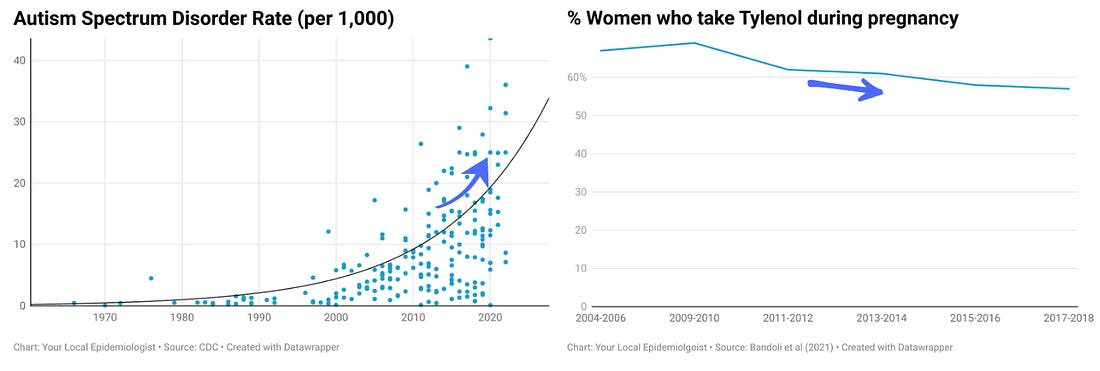Hits: 96
Enjoying this newsletter? Why not share it with a friend? Tylenol and autism: What parents deserve to knowNuance and empowerment instead of underestimation.
On Monday, RFK Jr.’s autism “report” landed. This was supposed to be the culmination of RFK Jr.’s months-long promise to “finally uncover” the cause of autism by September. But no report was published, no new science was unveiled, and no fresh data was presented. Instead, we got an X post, a press conference, and politicians coming to far-reaching conclusions from data that obstetricians, pediatricians, and scientists have already spent decades studying.
As an epidemiologist, I could see the falsehoods spewing out like a firehose with a few kernels of truth mixed in. But as a mom, the aftermath was visceral. My DMs and texts lit up with worry. Even the faint suggestion of blame haunts pregnant women and parents, piling more weight on shoulders already carrying enough. Being told to “toughen up”, without regard for the confusion, doubt, and guilt that are placed on us far too often these days. This is where I believe this “report” is making a grave mistake. They are underestimating the power of parents. Parents don’t need fearmongering or false certainty—they want accurate information, context, and respect. Not chaos, but clarity. Not underestimation, but empowerment with the best evidence at their fingertips to help them make the best decisions for themselves and their families. What happened earlier this week is far, far from this. And parents deserve better. Bottom line up frontScientists have been working to uncover autism for decades. This is ongoing, but for now, the balance of evidence shows this: There is no causal link between Tylenol use and autism. To all the mothers out there, you are doing amazing. Where did this claim come from?The idea that Tylenol (acetaminophen) use during pregnancy could be linked to autism has been investigated by the scientific community for more than a decade. Some scientists have wondered if Tylenol might affect a baby’s brain during pregnancy by stressing cells or changing certain chemical pathways. These hypotheses primarily originate from laboratory and animal studies at high doses. There have also been many, many human studies. The paper behind many of the headlines this week is a Harvard/Mount Sinai study that reviewed over 46 studies evaluating the associations between Tylenol and neurodevelopmental disorders, including autism and ADHD, with six studies focusing specifically on autism. They found a mix of conclusions:
These authors found a pattern consistent with rat studies: Tylenol, particularly during third trimester, was associated with higher risk. Also, they found a dose-response relationship: the more Tylenol someone had during pregnancy, the greater the associated risk. Importantly, the overall increased risk they found in these correlative studies was quite small. BUT. These were not randomized controlled trials (the gold standard), because it would be unethical to assign pregnant women to take or avoid Tylenol (the risks of untreated fever are real). Instead, each of these individual studies had to rely on observational methods. And observational studies can be tricky. They’re always vulnerable to confounding variables (what caused moms to take Tylenol in the first place?) or other factors (like genetics or environmental exposures) that may explain the pattern. In 2024, a major study from Sweden took the evidence a step further. Researchers there did something clever: they compared siblings. One child had been exposed to Tylenol during pregnancy, the other had not. This kind of “natural experiment” is powerful because it controls for what siblings share, including genetics and family environment. We know autism has a strong genetic component, so studies like this, controlling for genetics, are critical.
The Tylenol–autism link disappeared when comparing siblings.
When the researchers examined the data without sibling comparisons, they reproduced the same association that older studies had found. That means the study was strong enough to detect the association—but also strong enough to show it evaporated once they controlled for genetic and other environmental factors.
In other words, this evidence leans heavily toward correlation, not causation. (Tylenol is not the cause.) What else could explain changes in autism prevalence numbers?
Many epidemiologists do think there is a rise in autism due to improved recognition and diagnostic criteria, but not at the dramatic rate that the “report” insinuated. (Read more here for a deep dive into the data trends.) Autism is rooted in brain development. While neuroscience is still being mapped, we do know that some autistic brains show differences in neuron growth and connectivity—differences that originate in utero, when the brain is forming. So why do some developing brains take this path while others don’t?
Research shows that it’s highly genetic—85% of the risk is attributed to your genes. But genetics haven’t changed over time. Therefore, if there is an increase, it’s likely that environmental exposures. Tylenol use has decreased over time. So, again, another sign this isn’t leading to a dramatic rise in autism. Other hints include:
So what do parents do with this?All medications have risks and benefits, and that includes Tylenol. For pregnant moms trying to wade through the headlines, here’s where we’re at:
So, here’s how I would think about it:
Oversimplifying scienceIf you’ve watched RFK Jr.’s scientific claims over the last several decades, his claim that a commonly prescribed medicine is causing autism comes as no surprise. He has a long history of pointing fingers at medications—Tylenol, vaccines, you name it—as the root of health challenges. It’s a convenient scapegoat.
This taps into a common fallacy he often defaults to: the idea that “natural” is always good and “chemical” is always bad. This “appeal to nature” fallacy is seductive because it feels intuitive but it isn’t evidence-based. Reality is more complex. Plenty of natural things are harmful (arsenic, poison ivy), and plenty of man-made medicines save lives. Some diseases are naturally occurring. Some conditions—like autism—are part of the natural spectrum of human diversity. Pretending otherwise doesn’t just mislead; it actively harms families by piling on stigma and misplaced blame and providing empty solutions instead of support and real answers. Bottom lineThe “report” made a grave mistake: it underestimated parents and placed an undue burden of anxiety and guilt on them instead of empowering them to make informed decisions. Science is ongoing, but for now, the balance of evidence shows this: There is no causal link between Tylenol use and autism. To all the mothers out there, you are doing amazing. Love, YLE and KP Your Local Epidemiologist (YLE) is founded and operated by Dr. Katelyn Jetelina, MPH PhD —an epidemiologist, wife. YLE is a public health newsletter that reaches over 380,000 people in more than 132 countries, with one goal: to translate the ever-evolving public health science so that people are well-equipped to make evidence-based decisions. This newsletter is free to everyone, thanks to the generous support of fellow YLE community members. To support the effort, subscribe or upgrade below: |


